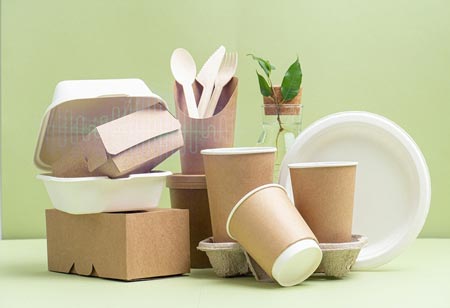

Thank you for Subscribing to Food Business Review Weekly Brief

The F&B industry is undergoing a sustainable packaging revolution, from compostable materials to edible packaging. This paradigm shift, responding to consumer demands, shapes a greener future, reflecting the sector's commitment to environmental responsibility and innovation.
Sustainability is taking center stage in the food and beverage (F&B) industry, propelling businesses to minimize their environmental impact. A significant paradigm shift is underway, with innovative packaging solutions reshaping the industry's future and meeting the surging demand for eco-conscious products. Compostable Materials: A Green Leap Forward One pioneering stride in sustainable packaging is the adoption of compostable materials, notably plant-based bioplastics. Serving as a green alternative to conventional plastics, these materials can be seamlessly composted alongside organic waste. This leads to a significant decrease in the amount of waste sent to landfills, providing an effective solution to minimize environmental damage. Edible Packaging: A Rising Star in Sustainability An emerging champion in sustainable solutions is edible packaging, carefully crafted from natural ingredients like seaweed or starch. These packages, designed to be consumed along with the food, eliminate the need for disposal. This innovative approach presents a promising avenue for waste reduction in the F&B industry, aligning with the broader sustainability goals. Recyclable Paper and Cardboard: Time-Tested and Sustainable Recognized as time-tested recyclable materials like paper, and cardboard are experiencing a resurgence in F&B packaging. Increasingly, companies are embracing these materials to ensure their products are wrapped in recyclable and reusable materials. This shift aligns with sustainability goals and caters to environmentally conscious consumer preferences. Biodegradable Plastics: Navigating the Plastic Predicament Addressing the persistent challenge of plastic waste, biodegradable plastics have emerged as a designed solution. Engineered to naturally break down over time, these materials mitigate environmental pollution and reduce waste accumulation. The introduction of biodegradable plastics represents a critical step towards sustainable packaging practices in the F&B industry. Sustainable Glass Packaging: The Timeless Choice Renowned for its recyclability and durability, glass packaging is gaining favor among F&B companies committed to sustainable practices. Opting for glass containers contributes significantly to sustainable packaging, as they can be recycled indefinitely without compromising quality. Innovative Pouches: Lightweight and Sustainable Pouches made from sustainable materials, such as compostable films or recyclable laminates, are gaining traction for their lightweight and flexible properties. This reduces material usage and lowers transportation costs while maintaining the product’s freshness. Plant-Based Fiber Packaging: Embracing Renewable Alternatives The adoption of packaging made from plant-based fibers, such as bamboo or sugarcane, introduces biodegradable options to the industry. These versatile fibers can be molded into various shapes, providing a sustainable alternative to traditional packaging materials. This approach aligns with the industry's growing emphasis on renewable resources. Reusable Packaging: Driving the Circular Economy The concept of reusable packaging is gaining momentum, with companies exploring innovative designs for returnable, refillable, or repurposable packaging. Beyond waste reduction, this approach fosters a circular economy within the F&B industry, promoting responsible resource use and reinforcing the commitment to sustainability. These packaging solutions contribute to a greener future as well as resonate with the growing consumer preference for environmentally conscious choices. As sustainability continues to shape the F&B landscape, these innovations play a pivotal role in creating a more sustainable and eco-friendly sector. By embracing these transformative practices, F&B companies position themselves as frontrunners in the evolving landscape of environmentally conscious business practices, setting the stage for a future where sustainability is not just a choice but a fundamental ethos.